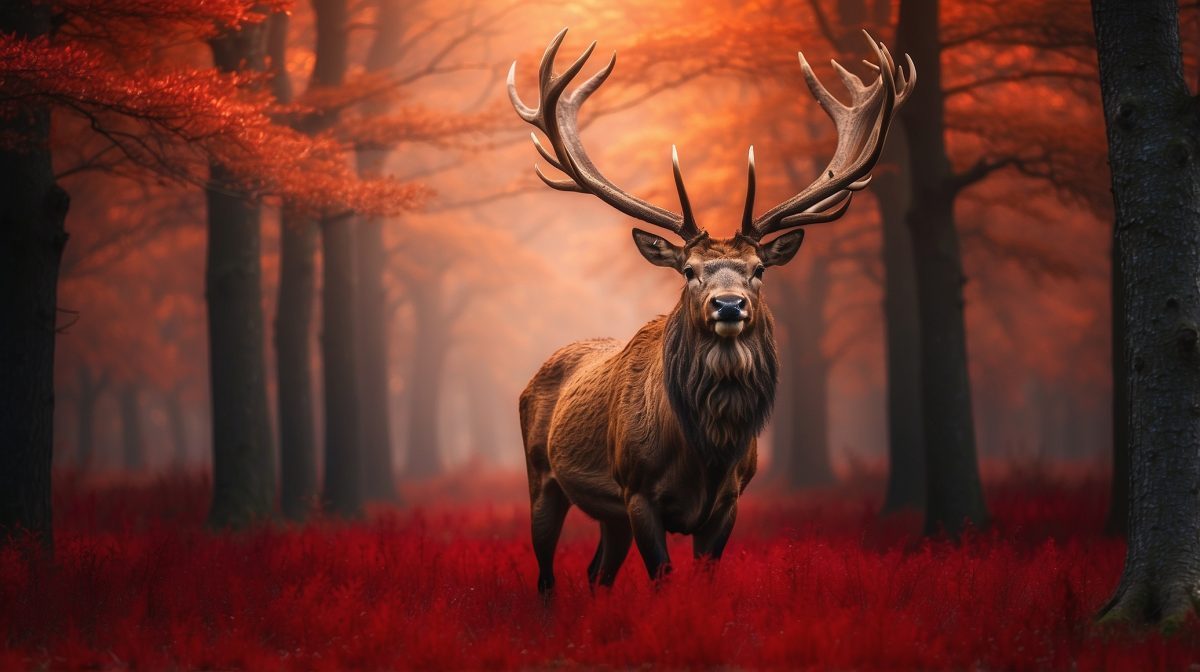The Red Stag Defined
Physical Characteristics
When it comes to size and weight, red stags are real behemoths of the deer world. These creatures can tip the scales at up to 530 pounds, with the stags dwarfing the hinds in size. Now, their antlers are a sight to behold—complex structures that can grow up to an inch a day during their peak growth cycle. They shed ’em once a year, and watching those antlers regrow is something else, I tell ya.
As for where these grand animals prefer to lay their hooves, their natural habitats span the varied terrains of Europe and Asia, with a particular fondness for forested areas and open grasslands. But don’t y’all be surprised to find them thriving in the Texas Hill Country, too. They’ve adapted to our landscape like a cowboy to a good pair of boots—fitting in just fine with our oak savannas and brushy pastures.
Diet and Behavior
Red stags are grazers by nature, feeding on a smorgasbord of grasses, plants, and leaves. They’re not too picky, which is good for their survival. Come the rutting season, though, their behavior changes dramatically. Stags bellow out their mating calls, a sound that echoes through the hills and valleys, as they vie for the attention of the hinds and the respect of their rivals.
The Life Cycle of a Red Stag
Early Life
Life for a red stag begins as a spotted calf, born after a gestation period that keeps the hinds busy for about eight months. These young’uns are quick to find their feet, but they’ll stick close to their mama for the first few months. The weaning stage is when they start to venture out more, learning the ropes of being a deer from their elders.
Maturity and Reproduction
Red stags and hinds reach maturity at different times, with the males taking a bit longer to fill out and command their own territory. By the time they’re five or six, they’re ready to take part in the annual rituals of courtship and breeding. The care of the offspring falls mostly to the hinds, who’ll fiercely protect their young from any threats.
Red Stags in Culture and History
Symbolism in European Traditions
The red stag holds a place of honor in many European traditions, symbolizing strength, virility, and nobility. Kings and lords would hunt the red stag as a testament to their power and skill, and it’s no wonder that this majestic animal has found its way onto countless coats of arms and family crests.
The Red Stag in Modern Times
In modern times, the red stag still captures our imagination and respect. Hunting traditions continue, with a focus on game management and conservation. The economic and ecological impact of these animals is not to be underestimated—they draw hunters, nature enthusiasts, and photographers from all over, eager to catch a glimpse or take part in a hunt.
Conservation and Management
Population Concerns and Threats
Despite their resilience, red stags face their fair share of threats, from habitat loss to poaching. It’s up to us to keep a keen eye on their populations, ensuring they don’t dip too low and upset the natural balance.
Role of Hunting Ranches in Conservation
Hunting ranches like the JL Bar Ranch Resort play a pivotal role in conservation efforts. By promoting sustainable hunting practices and habitat management, these ranches contribute to the health of red stag populations and, by extension, the local economy and ecosystem.
The Red Stag at JL Bar Ranch Resort
Guided Trophy Hunts
At the JL Bar Ranch Resort, we offer guided trophy hunts that are the stuff of legend. Our experienced guides know the land like the back of their hand and are passionate about delivering an ethical and memorable hunting experience.
The Experience of Hunting Red Stag
Hunting red stag is about more than just the pursuit—it’s about connecting with the land and the animal, respecting the tradition, and contributing to conservation efforts. It’s an experience that’ll stay with you long after you’ve left the ranch, I guarantee it.
Conclusion
Well, we’ve covered a fair bit of ground today, and I hope y’all feel a deeper connection to these red stags now. From their powerful presence in the wild to their storied place in our culture, these deer are truly a symbol of the majesty of nature. Out here in the Texas Hill Country, we’re mighty proud to share our land with them and even prouder to play a role in their conservation. May we always honor the spirit of the red stag and the wild, open spaces they call home.
FAQs
How can you tell the age of a red stag?
You can estimate a red stag’s age by looking at its antlers. The number of tines, or points, generally increases as they get older.
What’s the difference between red stags and other deer like whitetails?
Red stags are larger and have different antler structures compared to whitetails. They also have different habits and mating calls.
Are red stags dangerous during the rutting season?
During the rut, red stags can be aggressive and unpredictable. It’s wise to keep a respectful distance during this time.
How does the JL Bar Ranch Resort manage its red stag population?
The resort practices sustainable hunting and habitat management to ensure a healthy red stag population.
Can you eat red stag meat, and what does it taste like?
Yes, you can eat red stag meat, and it’s quite delicious—lean, rich, and with a slightly gamey flavor that’s a real treat for the taste buds.


